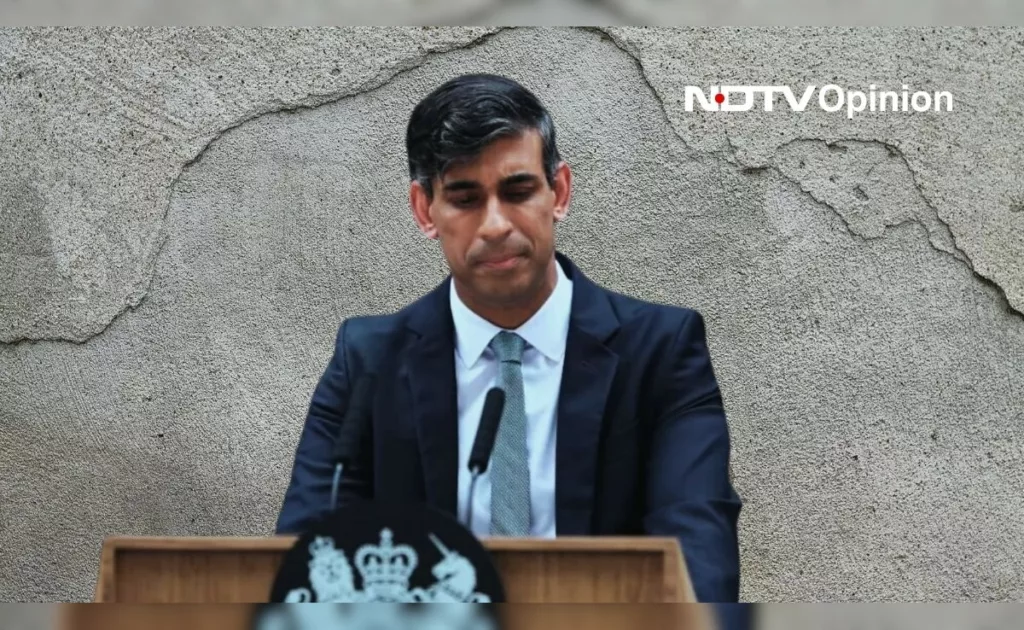“To the country, I would like to say first and foremost, I am sorry”. Those were Rishi Sunak’s words as he left Downing Street for the last time. “I have heard your anger, your disappointment”, he declared, “and I take responsibility for this loss.”
Sunak was addressing the nation outside Ten Downing Street, with his wife, Akshata Murty, at his side, before heading to the palace to resign as Britain’s Prime Minister. It was a brief and dignified address, tinged with humility and regret. The scale of the election defeat suffered by Rishi Sunak’s Conservatives is truly remarkable. The party has lost two-thirds of its seats in Parliament; there will be just over 120 Conservative MPs among the 650 members of the newly elected House of Commons. It’s the Conservatives’ worst-ever general election result.
Verdict: Failure
The final verdict on Rishi Sunak’s 20 months in office has to be: failure. He failed to achieve several of the political goals he had publicly set himself; he didn’t cut waiting times for hospital treatment or stem illegal immigration. He failed to unite his own party which, after 14 unbroken years in power, was increasingly quarrelsome and faction-ridden. And he failed to persuade the voters that he had a vision for Britain’s future.
There were some successes too. Rishi Sunak, a decent man, restored integrity to the post of Prime Minister after the damage inflicted by Boris Johnson’s clowning and deceit; he presided over a gradual improvement in the country’s economy; and he sorted out some of the lingering mess in the wake of Britain’s departure from the European Union.
Also Read | UK Elections: Mending India-Labour Relations Won’t Be Easy For Starmer
But he proved to have poor political instincts. He never gave the impression of being fully in charge, and was battered and buffeted by the rivalries within his own party. His election campaign was spectacularly inept. And his own reputation was tarnished by a bizarre decision to pull out early from global commemorations of the 80th anniversary of D-Day, a proud moment in Britain’s history that marked the turning of the tide against Nazi Germany in the Second World War.
At times, Rishi Sunak has faced political vitriol that some would see as racist. The right-winger Nigel Farage – leader of an anti-immigration party, Reform UK, which took millions of votes from the Conservatives – said during the campaign that Sunak’s D-Day misjudgement was because “he doesn’t understand our history and culture”. But Sunak’s lasting place in history is that he has been the first person of colour to head Britain’s government, and he has demonstrated beyond doubt that race is no longer a barrier to getting to the very top.
What Changes Under Starmer?
The Labour Party has achieved a landslide victory with the slogan ‘time for change’. Its leader, Keir Starmer – who has now succeeded Sunak as prime minister – will have a huge Parliamentary majority.
But in fact, there is likely to be little immediate change. Starmer has made clear that a Labour government will not increase taxes and there will be no alteration in foreign policy. The only immediate policy reversal is likely to be the abandoning of Sunak’s controversial and ill-considered plan to deport asylum seekers to Rwanda in central Africa.
Also Read | PM Modi Congratulates Keir Starmer For Win, Has A Message For Rishi Sunak
Rishi Sunak has made clear that he will stand down as leader of the Conservative party, but not straight away. He will remain in the post until a successor is chosen. And he emphasised that Conservatives needed to provide a ‘professional and effective’ opposition to the new Labour government – which will be seen as a warning against the Conservatives lurching to the right in the aftermath of their stinging defeat.
Sunak, The Ex-Politician?
Sunak has said he will remain an MP and he has denied suggestions that he’s planning to move to California, where the family has a home. But his time at the highest echelons of British politics is almost over. There is rarely any way back for a vanquished prime minister, and Sunak has been so bruised by his time in office that it’s unlikely he wants to return to top level politics. At 44, he’s young for a former prime minister, he is formidably clever, and he will not find life as a backbench MP very satisfying. So sooner or later, he’s likely to depart the political landscape altogether and carve out a new career.
(Andrew Whitehead is an honorary professor at the University of Nottingham in the UK and a former BBC India and Political correspondent.)
Disclaimer: These are the personal opinions of the author
